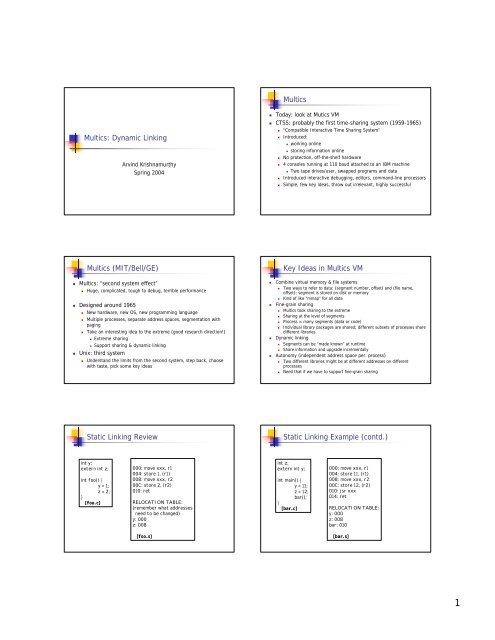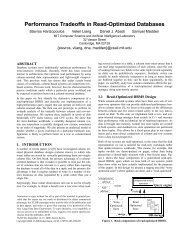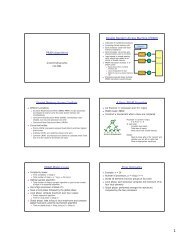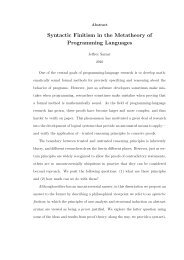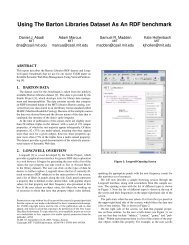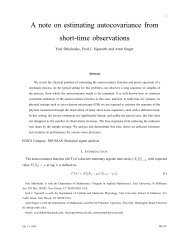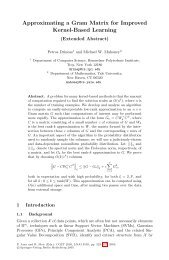Multics: Dynamic Linking Multics Multics (MIT/Bell/GE ... - Washington
Multics: Dynamic Linking Multics Multics (MIT/Bell/GE ... - Washington
Multics: Dynamic Linking Multics Multics (MIT/Bell/GE ... - Washington
Create successful ePaper yourself
Turn your PDF publications into a flip-book with our unique Google optimized e-Paper software.
<strong>Multics</strong>: <strong>Dynamic</strong> <strong>Linking</strong><br />
Arvind Krishnamurthy<br />
Spring 2004<br />
<strong>Multics</strong> (<strong>MIT</strong>/<strong>Bell</strong>/<strong>GE</strong>)<br />
<strong>Multics</strong>: “second system effect”<br />
Huge, complicated, tough to debug, terrible performance<br />
Designed around 1965<br />
New hardware, new OS, new programming language<br />
Multiple processes, separate address spaces, segmentation with<br />
paging<br />
Take an interesting idea to the extreme (good research direction!)<br />
Extreme sharing<br />
Support sharing & dynamic linking<br />
Unix: third system<br />
Understand the limits from the second system, step back, choose<br />
with taste, pick some key ideas<br />
Static <strong>Linking</strong> Review<br />
int y;<br />
extern int z;<br />
int foo() {<br />
y = 1;<br />
z = 2;<br />
}<br />
[foo.c]<br />
000: move xxx, r1<br />
004: store 1, (r1)<br />
008: move xxx, r2<br />
00C: store 2, (r2)<br />
010: ret<br />
RELOCATION TABLE:<br />
(remember what addresses<br />
need to be changed)<br />
y: 000<br />
z: 008<br />
[foo.s]<br />
<strong>Multics</strong><br />
Today: look at Mutics VM<br />
CTSS: probably the first time-sharing system (1959-1965)<br />
“Compatible Interactive Time Sharing System”<br />
Introduced:<br />
working online<br />
storing information online<br />
No protection, off-the-shelf hardware<br />
4 consoles running at 110 baud attached to an IBM machine<br />
Two tape drives/user, swapped programs and data<br />
Introduced interactive debugging, editors, command-line processors<br />
Simple, few key ideas, throw out irrelevant, highly successful<br />
Key Ideas in <strong>Multics</strong> VM<br />
Combine virtual memory & file systems<br />
Two ways to refer to data: (segment number, offset) and (file name,<br />
offset); segment is stored on disk or memory<br />
Kind of like “mmap” for all data<br />
Fine-grain sharing<br />
<strong>Multics</strong> took sharing to the extreme<br />
Sharing at the level of segments<br />
Process = many segments (data or code)<br />
Individual library packages are shared; different subsets of processes share<br />
different libraries<br />
<strong>Dynamic</strong> linking<br />
Segments can be “made known” at runtime<br />
Share information and upgrade incrementally<br />
Autonomy (independent address space per. process)<br />
Two different libraries might be at different addresses on different<br />
processes<br />
Need that if we have to support fine-grain sharing<br />
Static <strong>Linking</strong> Example (contd.)<br />
int z;<br />
extern int y;<br />
int main() {<br />
y = 11;<br />
z = 12;<br />
bar();<br />
}<br />
[bar.c]<br />
000: move xxx, r1<br />
004: store 11, (r1)<br />
008: move xxx, r2<br />
00C: store 12, (r2)<br />
010: jsr xxx<br />
014: ret<br />
RELOCATION TABLE:<br />
y: 000<br />
z: 008<br />
bar: 010<br />
[bar.s]<br />
1
Combined Result<br />
000: move 100, r1<br />
004: store 11, (r1)<br />
008: move 104, r2<br />
00C: store 12, (r2)<br />
010: jsr 018<br />
014: ret<br />
018: move 100, r1<br />
01C: store 1, (r1)<br />
020: move 104, r2<br />
024: store 2, (r2)<br />
028: ret<br />
100: (space for y)<br />
104: (space for z)<br />
Rewrite Symbolic references<br />
extern int y; /* “foo” */<br />
int z;<br />
int main() {<br />
...<br />
z = y + 1;<br />
...<br />
}<br />
Add a level of indirection:<br />
To prevent modifying code<br />
To share pointer across many<br />
references<br />
Sharing: Step 2<br />
000: ...<br />
004: move 0x100, r2<br />
008: load (r2), r3<br />
00C: load (r3), r4<br />
010: add r4, 1, r5<br />
014: store r5, ...<br />
100: Address: 0x200<br />
200: “foo:y”<br />
Has “symbolic ref” bit set<br />
to cause a link trap<br />
Cannot modify code shared by different processes<br />
P1’s Addr. Space P2’s Addr. Space<br />
Need per-process table for links<br />
Read X<br />
X: …<br />
Linkage section: all imports for a given segment, for a given process<br />
Linkage segment: collection of all linkage sections for a given process<br />
<strong>Dynamic</strong> <strong>Linking</strong>: Step 1<br />
Resolving external references at runtime<br />
Use a level of indirection:<br />
Initially symbolic references, later become memory references<br />
Indirect Call “libc:fprintf” Indirect Call<br />
“Link trap” occurs on first reference<br />
0xabcd<br />
Linker appends the segment to segment table<br />
Finds the symbol in symbol table for “fprintf”<br />
Overwrite the pointer to symbolic address<br />
Return back and retry the instruction<br />
Rewrite Symbolic references<br />
000: ...<br />
004: move 0x100, r2<br />
008: load (r2), r3<br />
00C: load (r3), r4<br />
010: add r4, 1, r5<br />
014: store r5, ...<br />
100: Address: 0x200<br />
200: “foo:y”<br />
Linkage Section<br />
Linkage<br />
Segment<br />
I:<br />
Linkage<br />
Pointer reg.<br />
foo:<br />
Read I(LP)<br />
X: …<br />
libc:<br />
0xabcd:fprintf<br />
000: ...<br />
004: move 0x100, r2<br />
008: load (r2), r3<br />
00C: load (r3), r4<br />
010: add r4, 1, r5<br />
014: store r5, ...<br />
100: Address: 1004<br />
1000: ...<br />
1004: location of y<br />
1008: ...<br />
P1’s Addr. Space P2’s Addr. Space<br />
Linkage section: links for all external references<br />
Layout of linkage section same across all processes<br />
This is the reason why “I” is process-independent<br />
2
Linkage Section Example<br />
extern int foo::y;<br />
extern int bar::z;<br />
int progtest() {<br />
...<br />
z = y;<br />
...<br />
}<br />
[prog.c]<br />
000: ...<br />
004: load 0(LP), r2<br />
008: load (r2), r3<br />
00C: load 4(LP), r4<br />
010: store r3, (r4)<br />
Linkage section for “prog”<br />
Has 2 entries:<br />
000: Address 100<br />
004: Address 200<br />
100: “foo::y”<br />
200: “bar::z”<br />
Step 3: Procedure call<br />
When PC is in segment, LP points to the segment’s linkage<br />
section<br />
At every procedure call, change LP<br />
How to do this?<br />
S1’s Linkage<br />
segment<br />
prog’s Linkage<br />
segment<br />
Procedure Call (contd.)<br />
Z:<br />
I:progtest’<br />
Set LP to Z<br />
progtest’:<br />
call progtest<br />
Note that location I in job1’s linkage segment is initially symbolic<br />
Map code segment of prog<br />
Instantiate linkage section for prog with 2 instructions per exported<br />
procedure<br />
S1<br />
call I(LP)<br />
prog<br />
progtest:<br />
Process so far…<br />
When process refers to the “prog” segment<br />
“link trap” happens<br />
Make code segment “prog” known<br />
Instantiate linkage section for “prog” in the linkage segment<br />
Use symbol table, cross-reference list from the object file<br />
When the code segment refers to the data “foo::y”<br />
“link trap” happens<br />
foo’s segment is loaded and foo’s linkage section is instantiated<br />
Modify address in linkage section for “prog” to point to “foo::y”<br />
Only problem left: how do you get the linkage pointer<br />
register point to the right place?<br />
S1<br />
Procedure Call<br />
call progtest<br />
progtest:<br />
When S1 calls prog::progtest<br />
Change LP to point to prog’s linkage section<br />
Then, jump to progtest<br />
prog S1’s Linkage<br />
section<br />
prog’s Linkage<br />
section<br />
Set LP;<br />
Jump progtest;<br />
Now progtest’s references will go through prog’s linkage section<br />
(for the current process only)<br />
Questions<br />
How many link traps does the following code generate:<br />
S1::foo() {<br />
for (j=0; j
Postscript<br />
Why so complicated?<br />
Fine-grained sharing<br />
<strong>Dynamic</strong> linking<br />
Independent address spaces<br />
For the next 20 years, no one attempted dynamic linking<br />
and sharing at the same time<br />
Until <strong>MIT</strong> takes revenge:<br />
<strong>MIT</strong> X-windows: megabytes of X toolkits<br />
Need shared libraries<br />
Similar mechanisms are now standard in all major<br />
operating systems<br />
4


